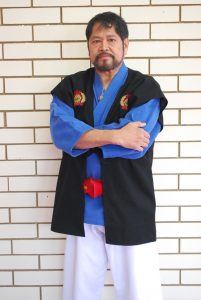Bullying at school is never far out of the spotlight. It’s an unfortunate reality that most parents have to deal with at some time. While there are many policies and approaches taken by schools and parents, one wonders if getting to the grass-roots and finding a preventive action is not best. This video discusses the merits of teaching martial arts in schools.
The martial arts have always upheld standards of granting respect and dignity to others and children who learn martial arts of any style learn these principles very early on. It is not only the respect to their instructors or teachers that is drilled but to each other as well.

The benefits of improved self-esteem, self-confidence and self-respect that children attain by practicing the martial arts are thought to reduce the chances that they will attract the attention of bullies who generally seek out those weaker than themselves while they are looking for easy prey.
A lack of confidence plays a big factor in who the bully selects to intimidate. Another big benefit of martial arts is the friendship that is promoted in classes, and the co-operative and respectful training can bridge cultural differences that sometimes give rise to bullying.
Martial arts can encourage role playing such as encouraging children to react calmly and confidently to taunting. Teaching your child how to show confidence rather than shyness and vulnerability can reduce their chances of being a victim. Children can learn to look people in the eye and speak up when they talk.
There is an argument that martial arts programs teach children to fight, not in fact reduce violence. There is truth in the saying “We learn to fight in the martial arts so we do not have to”. A martial artist walks with confidence, but rarely has to use their skills. Any bully can sense it.
Self-defence classes, as with any physical education program for children of this age, can be a fun way to learn new skills and keep active. The benefits of exercise, learning new psychomotor skills, achieving balance and coordination are undisputed and sorely needed in this digital age of couch-sitting, tablet-browsing screenagers with an increasing obesity level.
Physical activity and sport can be a powerful learning tool where children learn to respect each other and themselves and where they can be proud of their improvements. Undoubtedly self-defence can play a positive role as long the program is taught with high standards of safety and control.
Martial arts teach respect, honour, self-value, the right to protect one’s self and perhaps most importantly that violence is never the answer to conflict. It would seem there are some very good reasons to provide martial arts programs in schools when many children cannot access programs after school, similar to learning music at school.

Tino Ceberano Hanshi says “I’ve had the pleasure of being one of the advisory consultants to the program called the ‘Skills for Life’ and there are proven benefits in what it provides for youth at schools.
He states that legitimate martial arts programs in schools have great value and that the structured exercise benefits would impart more self-confidence in kids and reduce bullying.
Tino Hanshi said that even three months of basic karate training has been shown to positively channel the childrens’ energies as evidenced by his own personal teaching experience in coastal Queensland.
 Activities like karate are a fun way for both boys and girls to achieve fitness and focus. Some parents may think they also promote violence, but that’s a myth, according to experts.
Activities like karate are a fun way for both boys and girls to achieve fitness and focus. Some parents may think they also promote violence, but that’s a myth, according to experts.
The martial arts actually help teach self-discipline and socialization skills. In fact, many parents whose children have attention-deficit/hyperactivity disorder (ADHD) report great success with these programs because self-control and concentration are exactly the skills underdeveloped in ADHD kids.
John Ross Shihan from IGK VIC Headquarters at Canterbury says “Through martial arts, students can learn from their peers, develop discipline, and cultivate respect for different cultures. Martial arts strengthen muscles and endurance, while improving flexibility, balance, agility and coordination. ”
Lambros Kallianiotis Shidoin from IGK VIC Headquarters at Canterbury says that IGK dojos promote exercise that not only keeps children in good shape, but also helps them in developing positive attitude and teaching them discipline. Conducting martial arts classes in or outside of the school will let your students achieve better grades, perform better at sports and also hopefully behave well at home.
Tino Ceberano Hanshi says “If the IGK had the opportunity to assist in teaching our programs in schools, the self-respect, self-confidence and courtesy they gain through our martial arts classes will surely give them an advantage in not just school but also in their life, relationships and on their outlook towards life.
Teaching martial arts at schools certainly has its merits but regular training a few times a week may not be realistic in a school environment? Dedicated dojos with highly qualified personell trained to rigourous standards may provide better outcomes. There are pros and cons for both.
Find out more about the benefits of karate for children from any of the IGK dojos in Australia.